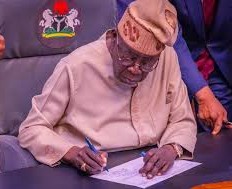Nigeria is set to review its 1999 constitution, and both citizens and stakeholders are observing how the National Assembly will address the requests from the public, various regions, and different groups in the proposed amendment draft. The review of the Nigerian constitution is taking place at a significant time in the nation’s history, as citizens,
Nigeria is set to review its 1999 constitution, and both citizens and stakeholders are observing how the National Assembly will address the requests from the public, various regions, and different groups in the proposed amendment draft.
The review of the Nigerian constitution is taking place at a significant time in the nation’s history, as citizens, stakeholders, and civil organisations have indicated the need to address national challenges, beginning with the country’s governing laws.
In response to numerous appeals from Nigerian citizens, the current National Assembly has proactively initiated revisions to existing legislation to address various emerging concerns throughout the country.
Regional constitutional review public hearings have been conducted in all six geopolitical zones of the country to collect opinions, memoranda, and proposals for reform as part of ongoing legislative consultations. A national public hearing on the constitutional alteration bills is scheduled for 22 September 2022.
The upcoming national public hearing will build on input from various groups—including governors, women’s organisations, traditional leaders, security representatives, professionals, and civil society—who previously discussed a wide range of proposals in July 2025 regional hearings.
The bills are organised around key issues raised by Nigerians, focusing on major governance challenges. These include proposed changes to election procedures such as single-day general elections, independent candidacy, and an Electoral Offences Commission, as well as reforms in political parties, the judiciary, and security, including consideration of state police.
The constitution review dialogue will cover issues such as creating local government election tribunals, enhancing independence, reducing delays, inclusive governance, the Special Seats Bill for women, fiscal transparency, human rights, devolution of powers, recognition of traditional institutions, and potential creation of new states or local governments.
As the identified concerns continue to accumulate, the forthcoming national public hearing will mark a pivotal stage during which the Senate and House of Representatives Committees on Constitution Review will compile and consolidate the reports for submission to their respective chambers. These chambers will then undertake legislative review, engaging in deliberations and making necessary amendments to the bills prior to forwarding them to the State Houses of Assembly for examination and concurrence. The process is anticipated to culminate with presidential assent.
Given the significance of the national public hearing—the final stage for citizen input on amending the country’s highest law—several key factors must be carefully considered before proceeding.
Earning Public Trust Through Transparency
Transparency and building trust are crucial for Nigeria’s upcoming constitution review. Public confidence in these processes has declined due to previous reviews lacking inclusivity, which undermines trust in public activities.
After gathering feedback from all geopolitical zones, the review committee and lawmakers should establish transparent communication and reporting systems to maintain legitimacy. Failing to do so risks perceptions of political manipulation rather than genuine nation-building.
Inclusive Democracy
In a democracy, inclusivity in constitutional review is crucial. Lawmakers should ensure that diverse groups—including women, youth, and people with disabilities—are actively involved in national discussions.
Laws can be effectively domesticated through collective ownership, involving traditional rulers, governors, civil society groups, and security agencies—a necessary step for a successful constitutional review.
Political Influence and Involvement
Another important consideration is the influence of politics on the constitutional process, as it significantly shapes the potential outcomes. As the 2027 general elections approach, it is anticipated that political actors may leverage the process to advance their interests.
For example, the process requires a two-thirds majority vote in both chambers of the National Assembly, ratification by at least 24 state legislatures, and presidential assent. The outcome of constitutional review is determined by how the adopted bills align with legislative requirements before becoming law.
Independent observers and civil society groups have urged that law amendments benefit all citizens, not just politicians. The reforms are expected to tackle widespread challenges at both urban and grassroots levels.
The upcoming national public hearing on the constitutional amendment is an important event in the country’s governance system. The actions and transparency of lawmakers at both state and federal levels, as well as the executive branch, will influence whether this review results in meaningful change or maintains the status quo. There are also expectations regarding the legislative arm of government, which is leading the process, to prioritize national interest over political considerations.



















